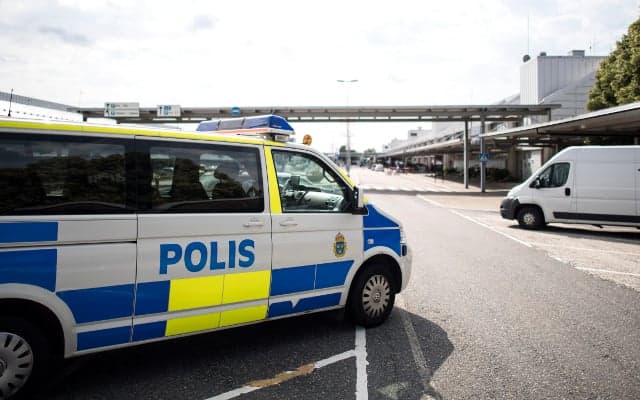Swedish police face tough task deporting failed asylum seekers

Sweden's Migration Agency expects to hand over around 50,000 deportation orders to the police in the coming years, but authorities are already struggling to deport those who have been told to leave.
When a person receives a negative reply to their asylum application, they are in the first instance asked to leave the country voluntarily. In the next instance the case gets handed over to the police.
Police have so far this year deported more than 3,000 unsuccessful asylum seekers in this way. But they are currently working with around 17,000 cases, and of those 12,000 have gone underground.
The remaining 5,000 face further obstacles, according to the head of the border police, who told broadcaster SVT on Sunday that a large part of those cannot be deported for various reasons.
"It could be countries that won't accept them, or that their identity can't be confirmed. The 12,000 who have gone underground are of course even more difficult," Patrik Engström told SVT.
READ ALSO: Man back in Sweden after failed deportation attempt
The Migration Agency expects that around 50,000 deportation cases will be handed over to police authorities in the next few years as Sweden continues to process a backlog of asylum applications.
"It's an enormous challenge. It will require a strong boost of resources and modified working methods. We need to work closer to the Migration Agency and get these cases earlier. At the same time we need a balance between voluntary returns – as the legislature wants – and the need for coercion," said Engström.
Sweden's border police have previously expressed fears that there could be an increase in undocumented migrants in the country who are vulnerable to crime and exploitation.
"There are people who become victims of crime and people who commit crimes. It would be an extremely unfortunate development," Engström told SVT on Sunday.
In April, the Swedish government proposed new measures to try to help improve the success rate in deportation cases, including giving police an increased ability to carry out inspections of workplaces.
A high-profile example of someone police were looking for after being handed a deportation order is Stockholm terror attack suspect Rakhmat Akilov, who disappeared after getting a deportation decision in December 2016.
READ ALSO: Why deporting people is not a straightforward matter
Comments
See Also
When a person receives a negative reply to their asylum application, they are in the first instance asked to leave the country voluntarily. In the next instance the case gets handed over to the police.
Police have so far this year deported more than 3,000 unsuccessful asylum seekers in this way. But they are currently working with around 17,000 cases, and of those 12,000 have gone underground.
The remaining 5,000 face further obstacles, according to the head of the border police, who told broadcaster SVT on Sunday that a large part of those cannot be deported for various reasons.
"It could be countries that won't accept them, or that their identity can't be confirmed. The 12,000 who have gone underground are of course even more difficult," Patrik Engström told SVT.
READ ALSO: Man back in Sweden after failed deportation attempt
The Migration Agency expects that around 50,000 deportation cases will be handed over to police authorities in the next few years as Sweden continues to process a backlog of asylum applications.
"It's an enormous challenge. It will require a strong boost of resources and modified working methods. We need to work closer to the Migration Agency and get these cases earlier. At the same time we need a balance between voluntary returns – as the legislature wants – and the need for coercion," said Engström.
Sweden's border police have previously expressed fears that there could be an increase in undocumented migrants in the country who are vulnerable to crime and exploitation.
"There are people who become victims of crime and people who commit crimes. It would be an extremely unfortunate development," Engström told SVT on Sunday.
In April, the Swedish government proposed new measures to try to help improve the success rate in deportation cases, including giving police an increased ability to carry out inspections of workplaces.
A high-profile example of someone police were looking for after being handed a deportation order is Stockholm terror attack suspect Rakhmat Akilov, who disappeared after getting a deportation decision in December 2016.
READ ALSO: Why deporting people is not a straightforward matter
Join the conversation in our comments section below. Share your own views and experience and if you have a question or suggestion for our journalists then email us at [email protected].
Please keep comments civil, constructive and on topic – and make sure to read our terms of use before getting involved.
Please log in here to leave a comment.